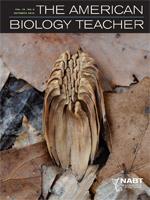We used a design-based research approach to develop “data-rich problem” (DRP) tasks intended to support middle and high school students in constructing knowledge about food webs and ecosystem dynamics, specifically the effects of species loss. The marine environment is used for context to promote an understanding of interdependent ecological relationships and the nonlinear and sustaining effects of loss of species. The Food Web DRP tasks we describe are designed for classroom implementation in alignment with the Next Generation Science Standards. The intended time frame for implementation is five days (assuming 50-minute class periods).
How to translate text using browser tools
1 October 2016
Understanding Causal Relationships in Food Webs Using “Data-Rich Problem” Tasks
Marin E. Silva,
April C. Maskiewicz
ACCESS THE FULL ARTICLE
It is not available for individual sale.
This article is only available to subscribers.
It is not available for individual sale.
It is not available for individual sale.

The American Biology Teacher
Vol. 78 • No. 8
October 2016
Vol. 78 • No. 8
October 2016
data-rich problem tasks
ecosystems
Food web
Next Generation Science Standards
nonlinear relationships
systemic relationships




